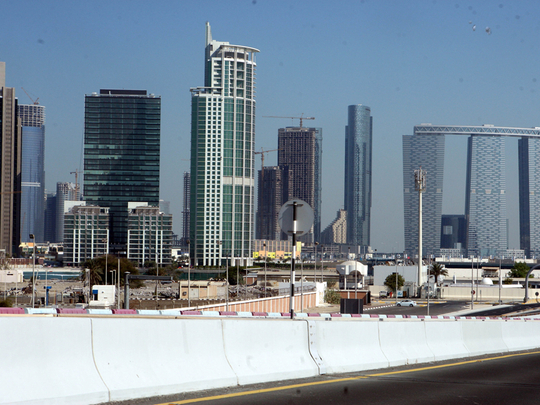
Abu Dhabi: Abu Dhabi finally gets to have the sub-Dh1 million homes to revive buying activity across its property market. Aldar’s offering of strategically priced apartments — with studios from Dh450,000 — on Al Reem Island sets the stage for a mid-market led upturn.
These units form part of Aldar’s latest launch, evocatively named as “The Bridges”, and offering up to three-bedroom variants.
The Aldar portal says registrations will open at Cityscape Abu Dhabi opening Tuesday, and comprises “six mid-rise towers, each offering 212 homes.”
READ MORE:
Cost of living in Abu Dhabi to increase as municipality fee kicks in
Off-plan units up for sale in greater numbers
Expats at home on Reem Island
Horizon Towers to take its place on Reem Island
These units can effectively bridge the gap that exists in Abu Dhabi for mid-tier properties.
“At those price points and that too in an already established location such as Al Reem creates opportunities for investors and end-users where none existed,” said Sameer Lakhani, Managing Director of Global Capital Partners.
“It brings back buyers into a market where there continues to be a fall in property values, yields and rents on the pricier properties. Aldar, Reem Island and sub Dh1 million will be top draws,” Lakhani added.
Formula
It is a formula that worked extremely well for Dubai since the second quarter of 2016 and helped arrest the decline in buying volumes and of values, at least to a certain extent.
Those gains were built around back-to-back launches at Dubai South, with launches there led by Emaar, MAG and direct from the master-developer, Dubai South.
From that location, the buying burst spread to other freehold clusters in Dubai and even into higher priced locations such as Dubai Creek Harbour. It explains why real estate in Dubai managed to turn in the volumes even while other sectors still feel the crunch.
But for the Abu Dhabi experiment to succeed, other developers need to jump onto the bandwagon at the earliest available opportunity.
It happened in Dubai in the second-half of 2016, when new launches were priced lower than in the secondary market and for smaller units as well.
Developers such as Danube Properties and Azizi Developers worked around these strategies.
So, Abu Dhabi needs those numbers — properties that are clearly seen to have a lower entry point than the standard options available until now.
According to market sources, some of it is already happening, though it may not be as obvious as a Dh450,000 for a studio offer.
Changing market conditions
“In this current economic climate, we have seen more of product re-launching after undergoing modifications to better suit to prevailing market fundamentals and demand scenarios,” said Simon Townsend, Head of Research and Valuations, CBRE M.E.
“The changes to market conditions have also seen some other intrinsic factors having an impact on launches. These can, for instance, be obtaining either government or master-developer consents for proposed projects," Townsend added.
“The downward trend on rents is prevalent across all property types. However, it is the higher-tier that experienced severe rental drops compared to other residential products. The limited availability of affordable housing units - particularly in central locations — continue to cushion this segment from significant rental fluctuations.”
It will also be interesting to see whether the launch of The Bridges and, possibly, others of a similar range will be able to arrest the decline in property values – and rents – seen in Abu Dhabi since the early 2015 and which accelerated all through 2016.
“Broadly speaking, apartments and villas across Abu Dhabi’s investment zones have fallen by roughly the same amount,” said Lakhani. “However, when you look at specific high-end villa communities, the erosion in values have been higher.
“This reaffirms the point that we have been saying a while — which is that there has been a greater erosion of values at the luxury end, not only in Abu Dhabi and Dubai, but something that is being witnessed in real estate markets elsewhere.”











